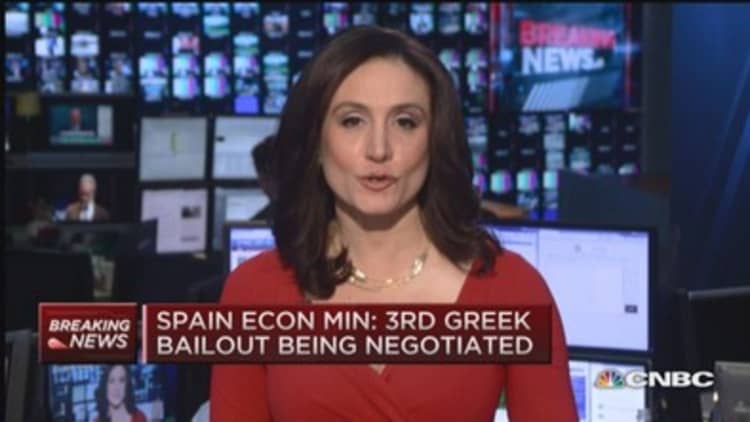While signs of an economic revival in Europe remain tentative at best, economists say one country has emerged as the region's shining star: Spain.
"We believe growth will continue to surpass expectations in 2015, anchored by both structural reform and positive cyclical factors," said economists at AB, formerly known as Alliance Bernstein, in a recent note.
AB expects Spain's economy to expand 2.5 percent this year, above consensus estimates of 2.2 percent and Prime Minister Mariano Rajoy's 2.4 percent forecast. It's also well above the euro zone's projected 1.6 percent expansion.
Spain already has the second-fastest growth rate in the euro zone, with fourth-quarter gross domestic product up 2 percent on year. 2014 saw the economy expand 1.4 percent, a dramatic recovery from the 1.2 percent contraction in 2013 and the first year of annual positive growth in Spain since the onset of the crisis in 2008.
Read MoreBullish on Europe? Don't ignore the risks
Analysts at BBVA are equally bullish, predicting 2.7 percent growth for both this year and 2016. That in turn should create a million jobs by the end of 2016, bringing the unemployment rate down to 20 percent from 23.7 percent currently.
"The trend in the variables indicates that the Spanish economy's recovery will press on in 2015," the bank said in a report on Wednesday, citing tax reforms, robust private demand, supportive fiscal and monetary measures and recent structural changes like re-directing production to the export sector.
Recent data underpins economic optimism. Retail sales rose for the sixth consecutive month in January, while house prices increased at their fastest rate in six years during the fourth-quarter.

Over 80 percent of Spanish finance executives are now bullish on the economy, up from 69 percent previously, according to an American Express survey published last week.
Risks remain
Still, not everyone is convinced that Spain has fully recovered.
"With high levels of unemployment, and of youth unemployment in Spain, even if things improve we can't tell people, or ourselves, that the crisis is over," European Commission chief Jean-Claude Juncker told Spanish media last week.
Meanwhile, a general election at the end of this year is also seen as a key threat. While the election is set to bring about policy uncertainty, the greater risk is that it that could see anti-austerity party Podemos rise to power in a similar fashion to Greece's Syrzia administration.
"There is a high degree of uncertainty surrounding the political scene in Spain at the moment," said Nomura political analysts Alastair Newton and Frida Wallnor.
"One way or the other, we expect an inconclusive outcome – either a minority government or, possibly, a PSOE/Podemos coalition, neither of which we think would be welcomed by markets," they added.
However, AB is not concerned by political risks.
"We don't expect the election to derail Spain's recovery—even if the leftist Podemos enters government as part of a new ruling coalition."

